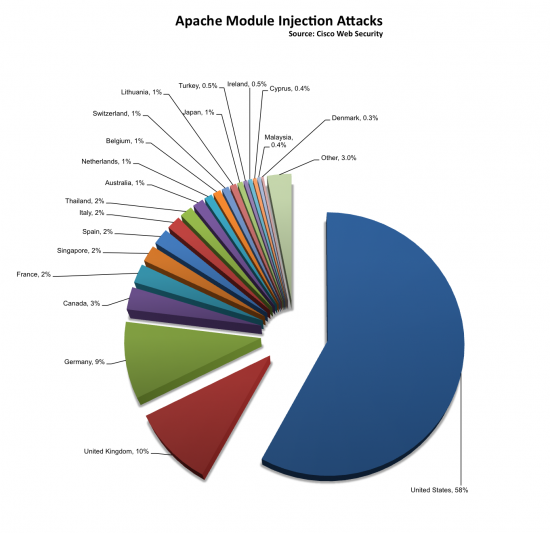































Dan Goodin, editor at Ars Technica, has been tracking and compiling info on an elusive series of website compromises that could be impacting tens of thousands of otherwise perfectly legitimate sites. While various researchers have reported various segments of the attacks, until Dan's article, no one had connected the dots and linked them all together.
Dubbed "Darkleech," thousands of Web servers across the globe running Apache 2.2.2 and above are infected with an SSHD backdoor that allows remote attackers to upload and configure malicious Apache modules. These modules are then used to turn hosted sites into attack sites, dynamically injecting iframes in real-time, only at the moment of visit.
Because the iframes are dynamically injected only when the pages are accessed, this makes discovery and remediation particularly difficult. Further, the attackers employ a sophisticated array of conditional criteria to avoid detection:
When the iframe is injected on the page, the convention used for the reference link in the injected iframe is IP/hex/q.php. For example:
129.121.179.168/d42ee14e4af7a0a7b1033b8f8f1eb18a/q.php
The nature of the compromise coupled with the sophisticated conditional criteria presents several challenges:
The magnitude of the problem becomes clear when one considers how widespread these attacks are. The following chart illustrates the geographic location of infected host servers observed from February 1-March 15, 2013. (Click the chart to view in full size).

For additional info and links to specific remediation advice, see: Ongoing malware attack targeting Apache hijacks 20,000 sites
 Tags quentes :
Cisco Security
TRAC
Cisco SIO
apache
apache darkleech compromise
apache module injection attacks
SSHD backdoor
Tags quentes :
Cisco Security
TRAC
Cisco SIO
apache
apache darkleech compromise
apache module injection attacks
SSHD backdoor